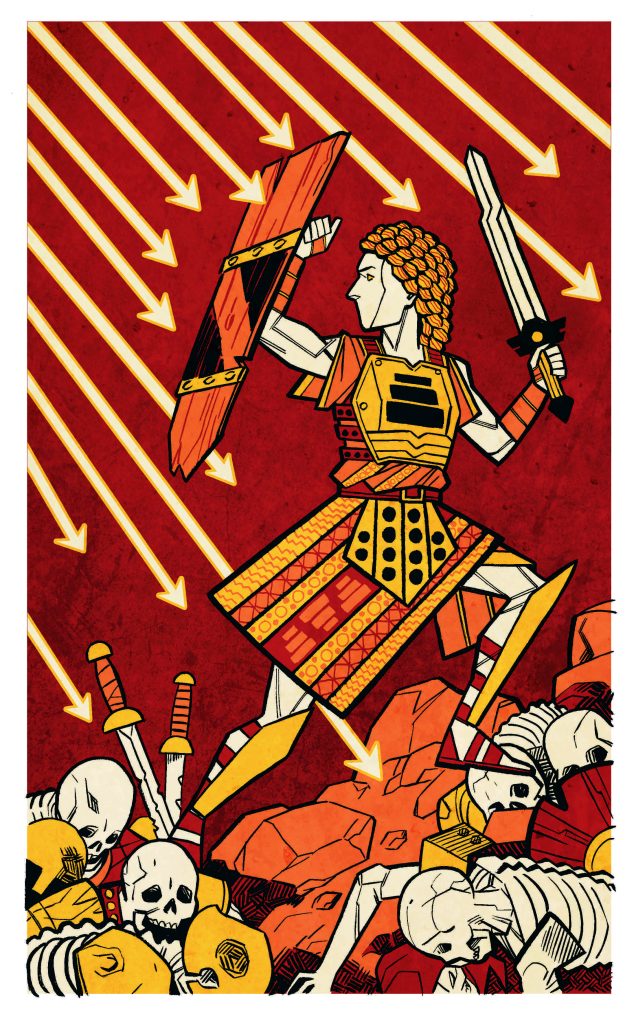
You have passed through death and returned stronger than before, and now you are the last hope of a world besieged by nightmares. To defeat the Dread you will have to unravel ancient mysteries and overcome terrifying threats. You have seven lives to save the world: make each one count.
Phoenix: Dawn Command is a roleplaying game in which death is how your character grows stronger. My co-designer Dan Garrison and I wanted to find a way to capture the drama and tension of moments like Gandalf facing the balrog in Moria, moments where a hero can overcome impossible odds—but often with a terrible price. Phoenix is a game where the most dramatic moments come from difficult decisions rather than random die rolls. A few key elements…
- In Phoenix, death isn’t the end of the story… but its very significant. Phoenixes return after death, stronger than before. But they don’t return right away; they don’t return to the place where they died; and most important, they can only return seven times. Each death grants you greater power—but it also brings you closer to the final end. Just because you CAN return doesn’t mean you want to throw your life away; but it means that you can choose to sacrifice your life to bring down the balrog, knowing you will return.
- Phoenix doesn’t use dice. Instead, each character is tied to a deck of cards, and you play cards to determine the outcome of your actions. This grants the player more narrative control: you know what you have to work with this round, and won’t waste your turn trying to do something cool only to roll a one. Beyond this, you can push beyond the value of your cards using Sparks, which represent your magical essence. But when you run out of Sparks, you die. So you can buy success—but is it worth the cost? Is this the right moment to go all in?
People have asked if they could adapt Phoenix to Eberron or d20. We specifically chose NOT to make it using the d20 system because the degree of narrative control that comes from the card-based system of Phoenix is an important element. When the wraith slashes at you with its spectral blade, you know you could avoid it, spending your cards on defense. But you also know that one blow won’t be enough to kill you. Do you evade the attack? Or do you grit your teeth and take the wound, knowing that you can use your good cards to crush the wraith on your next turn? This is a key point of what Phoenix is about. Whether an enemy hits you isn’t about a random roll against your armor class; it’s about whether it’s more important to you to avoid damage or to deal it. With that said, this article talks about how I’d combine Phoenix and Eberron, and it’s also something I explore in a different way in my collaboration with Magic Sword on the DM’s Guild.
I love Phoenix: Dawn Command, and I hope to do more with it in 2021. With that in mind, we want to give you a chance to experience it for yourself. So for today—Monday, November 30th—Phoenix Dawn Command is 80% off in our webstore. Shipping is still significant—the game weighs 6 pounds!—but you can get the game itself for just $10. This includes everything you need for a DM and up to 4 players to play, including a seven-mission adventure path.
So if you’re ever been curious about Phoenix: Dawn Command, now is the time to check it out!
UPDATE: We are currently dealing with technical issues and Phoenix is unavailable. We will repeat the sale for 24 hours once we have this resolved.

Still hoping to get to run Phoenix Dhakaani Command sometime. It is a very fun game.
I’ve done 4 sessions of it. Wonderful!
I bought two! One gift and one spare (I first purchased 2 years ago).
This looks great. I just bought it and can’t wait to play it with my belgian friends at Xmas.
I’ve looked into it, and it really looks interesting! The lore is neat and the gameplay mechanic really isn’t something I think I’ve seen before.
Incidentally, what School would best fit the “magic knight” or “gish” archetype? Bitter seems like the most obvious, but Elemental or Forceful could work depend on how you flavor it and the Champion of the Dawn archetype for Devoted sounds like what D&D would call a paladin.
You’re not limited to a single School. So you could combine Elemental and Forceful very effectively, or add a little Durant to your Devoted to support a paladin playstyle. The main thing is that the Lessons you gain after death are tied to why and how you died; so if you’re looking to add some Elemental to your Forceful deck, you need to focus on dying for duty.
Exactly. While each school has flavor, most actions can be described in whatever way you choose to personalize. The mechanics system has a great balance of simplicity and nuance that never “skins” much to begin with, so you don’t so much “re-skin” as you do just skin everything according to your character concept and growth over the course of their deaths.
About when can we expect these to start shipping?
That depends on when you ordered it. The initial wave when we first began the sale should have shipped immediately. Once we sold out, we noted on the site that shipment would be delayed; we expected to ship December 22nd, but right now shipping is unpredictable. If you reach out to us directly at info@twogetherstudios.com we can track your particular order.
I just got mine today….it’s a brick! 6 pounds is no fooling!